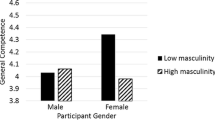Abstract
A rich literature exists that examines individuals' perceptions of affirmative action in organizations. However, little is known regarding the evaluation of reverse gender discrimination claims arising from gender-based preferential treatment. This study investigated the possible existence of a gender similarity bias in evaluations of gender discrimination allegations using a laboratory experiment in which the strength of evidence against the defendant company and the gender of the plaintiff were manipulated. Our sample consisted of 120 undergraduate students (60 men, 60 women) from diverse racial/ethnic groups (35% Asian, 6% African American, 18% Hispanic, and 41% Caucasian). Results suggested that female mock jurors favored female plaintiffs over male plaintiffs. In contrast, there were no gender-related differences in perceptions of male plaintiffs. Thus, although women did not disadvantage male plaintiffs, there was a tendency for them to be favorably biased in favor of female plaintiffs. As expected, this tendency was greatest under conditions of evidential uncertainty about the company's guilt.
Similar content being viewed by others
REFERENCES
Aven, F. F., Parker, B., & McEvoy, G. M. (1993). Gender and attitudinal commitment to organizations: A meta-analysis. Journal of Business Research, 26, 63-73.
Barrett, G. V., & Kernan, M. C. (1987). Performance appraisal and terminations: A review of court decision since Brito v. Zia with implications for personnel practices. Personnel Psychology, 40, 489-503.
Bobocel, D. R., & Farrell, A. C. (1996). Sex-based promotion decisions and interactional fairness: Investigating the influence of managerial accounts. Journal of Applied Psychology, 81, 22-35.
Civil Rights Act of 1991, 42 U. S. C. 1981 (1991).
Coalition for Economic Equity v.Wilson, 118 S. Ct. 397, 139 L. Ed. 310 (1997).
Dillingham, A. E., Ferber, M. A., & Hamermesh, D. S. (1994). Gender discrimination by gender: Voting in a professional society. Industrial and Labor Relations Review, 47, 622-633.
Dodd-McCue, D.,& Wright, G.B. (1996). Men, women and attitudinal commitment:The effects of workplace experiences and socialization. Human Relations, 49, 1065-1091.
Elkins, T. J., & Phillips, J. S. (1999). Evaluating sex discrimination claims: The mediating role of attributions. Journal of Applied Psychology, 84, 186-199.
ForsterLee, R., Horowitz, I. A., Ho, R., ForsterLee, L., & McGovern, A. (1999). Community members' perceptions of evidence: The effects of gender in a recovered memory civil trial. Journal of Applied Psychology, 84, 484-495.
Foster, M.D. (1999). Acting out against discrimination: The effects of different social identities. Sex Roles: A Journal of Research, 40, 167-186.
Golding, J. H., Sego, S. A., Sanchez, R. P.,& Hasemann, D. (1995). The believability of repressed memories. Law and Human Behavior, 19, 569-592.
Gowan, M. A., & Zimmerman, R. A. (1996). Impact of ethnicity, gender, and previous experience on juror judgments in sexual harassment cases. Journal of Applied Social Psychology, 26, 596-617.
Gutek, B. A., Cohen, A. G., & Tsui, A. (1996). Reactions to perceived sex discrimination. Human Relations, 49, 791-813.
Heilman, M. E., Battle, W. S., Keller, C. E., & Lee, R. A. (1998). Type of affirmative action policy: A determinant of reactions to sex-based preferential selection? Journal of Applied Psychology, 83, 190-205.
Heilman, M. E., Block, C. J., & Lucas, J. A. (1992). Presumed incompetent? Stigmatization and affirmative action efforts. Journal of Applied Psychology, 77, 536-544.
Heilman, M. E., Block, C. J., & Stathatos, P. (1997). The affirmative action sigma of incompetence: Effects of performance information ambiguity. Academy of Management Journal, 40, 603-625.
Heilman, M.E., Kaplow, S. R., Amato,M. A.,& Stathatos, P. (1993). When similarity is a liability: Effects of sex-based preferential selection on reactions to like-sex and different-sex others. Journal of Applied Psychology, 78, 917-927.
Heilman, M. E., McCullough, W. F., & Gilbert, D. (1996). The other side of affirmative action: Reactions of nonbeneficiaries to sex-based preferential selection. Journal of Applied Psychology, 81, 346-357.
Hopwood v. Texas, 84 F.3d 720 (5th Cir. 1996).
Johnson, J. D., Jackson, L. A., Gatto, L., & Nowack, A. (1995). Differential male and female responses to inadmissible sexual history information regarding a rape victim. Basic and Applied Social Psychology, 16, 503-513.
Key, H. G., Warren, A. R., & Ross, D. F. (1996). Perceptions of repressed memories: A reappraisal. Law and Human Behavior, 5, 555-563.
Loftus, E. F. (1993). The reality of repressed memories. American Psychologist, 48, 518-537.
Loftus, E. F., Weingardt, K. R.,& Hoffman, H.G. (1993). Sleeping memories on trial: Reactions to memories that were previously repressed. Expert Evidence, 2, 51-59.
Saltzman, A. (1997, September 22). Suppose they sue? Why companies shouldn't fret so much about bias cases. U.S. News & World Report, p. 68.
Turner, J. C., Hogg, M. A., Oakes, P. J., Reicher, S. D., & Wetherell, M. S. (1987). Rediscovering the social group: A theory of self-categorization. New York: Basil Blackwell.
Veglahn, P. A. (1993). Key issues in performance appraisal challenges: Evidence from court and arbitration decisions. Labor Law Journal, 44, 595-606.
Wachtel, H. K. (1998). Student evaluation of college teaching effectiveness: A brief review. Assessment and Evaluation in Higher Education, 23, 191-211.
Werner, J. M., & Bolino, M. C. (1997). Explaining U. S. Courts of Appeals decision involving performance appraisal: Accuracy, fairness, and validation. Personnel Psychology, 50, 1-24.
Author information
Authors and Affiliations
Corresponding author
Rights and permissions
About this article
Cite this article
Elkins, T.J., Phillips, J.S., Konopaske, R. et al. Evaluating Gender Discrimination Claims: Is There a Gender Similarity Bias?. Sex Roles 44, 1–15 (2001). https://doi.org/10.1023/A:1011059131505
Issue Date:
DOI: https://doi.org/10.1023/A:1011059131505



